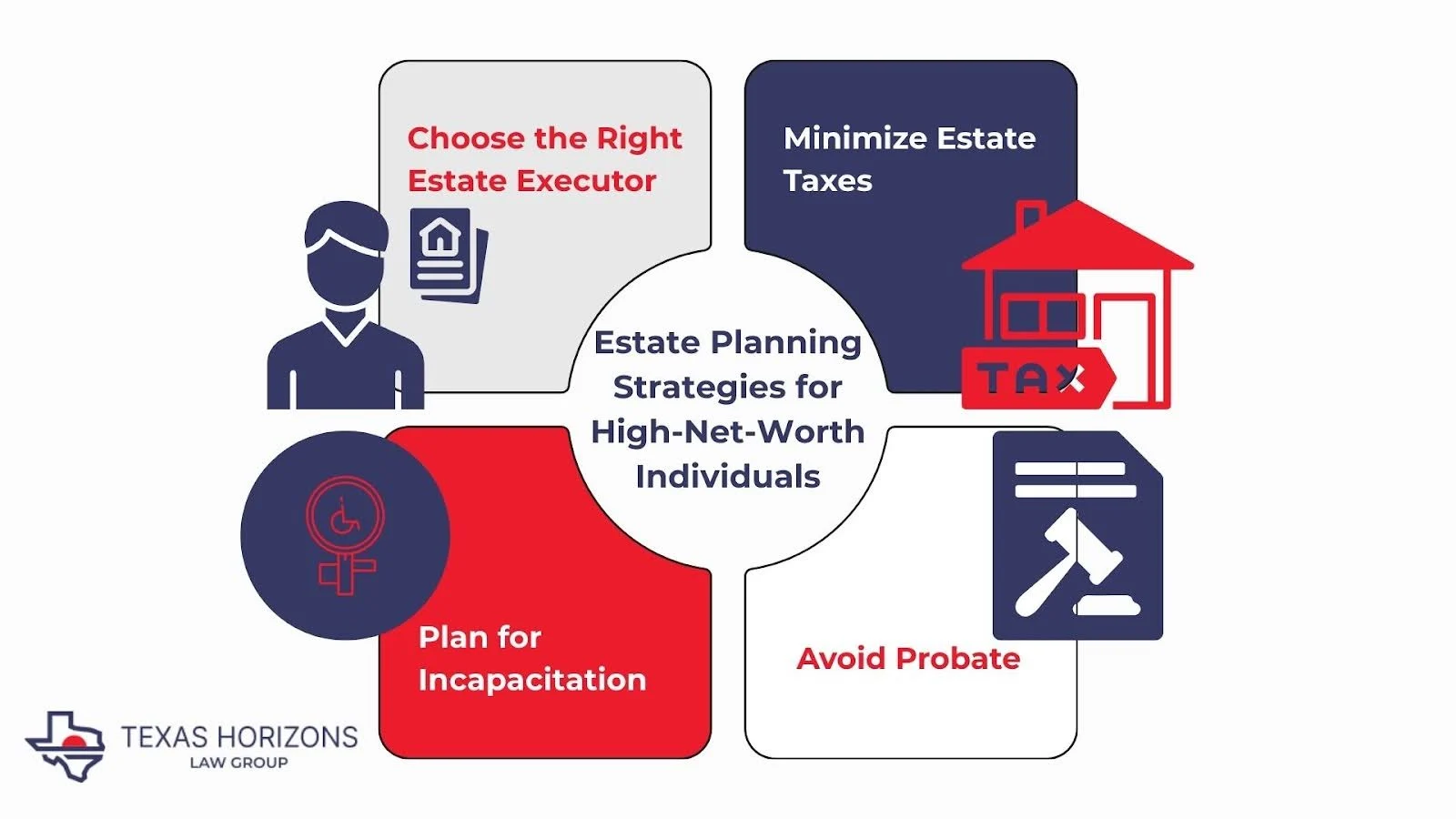Estate planning is a crucial aspect of financial management, especially for high-net-worth individuals (HNWIs) and ultra-high-net-worth families. It’s not just about protecting assets; it’s about minimizing estate taxes, avoiding probate, and ensuring that wealth is passed on smoothly to the next generation. For wealthy individuals in Texas, the estate planning process can be complex, but with the right strategies and expert representation, it’s possible to achieve both financial security and peace of mind.
This guide from our Texas Board-Certified Seguin and New Braunfels estate planning attorneys will break down the key considerations for estate planning in Texas, including trusts, tax strategies, and how to protect wealth for future generations.
What Is Considered High-Net-Worth for Estate Planning?
An HNWI is typically someone with at least $1 million in liquid financial assets. While there's no single, official definition, this benchmark is widely used by financial institutions to define the status. It often excludes the value of a person's primary residence.
Individuals with substantial assets, including property, investments, and business interests, must consider the tax implications of transferring these assets after death. Estate taxes, income taxes, and other tax liabilities could erode a significant portion of the wealth you've worked hard to accumulate.
Effective estate planning strategies can minimize these taxes and ensure that your heirs inherit wealth in a tax-efficient manner.

1. Hiring the Right Executor of Your State
One of the most critical decisions in estate planning is choosing an executorwho will manage your estate after you pass away. Your executor will be responsible for carrying out your wishes, managing your assets, and distributing wealth to your beneficiaries.
If your estate planning involves a trust or trusts, choosing a trustee involves more than just selecting a trusted family member. While family members may be an obvious choice, it’s also worth considering corporate trustees, especially if your estate is complex.
2. Reducing Estate Taxes
One of the primary concerns for ultra-high-net-worth individuals is minimizing estate taxes. In Texas, there is no state estate tax, which is a huge advantage for residents. However, federal estate taxes can still be significant, especially for estates that exceed the exemption limit.
For 2025, the federal estate tax exemption is $13.99 million for individuals and $27.98 million for married couples. Any estate value exceeding these thresholds will be subject to estate taxes.
Here are a few strategies to minimize estate taxes in Texas.
Gift Tax Planning
Wealthy individuals can make annual gifts up to a certain limit without triggering the federal gift tax. For 2025, the limit is $19,000 per recipient. Making use of the annual gift tax exclusion can reduce the size of your taxable estate.
Irrevocable Trusts

One of the most powerful estate planning tools for reducing estate tax liability is the use of irrevocable trusts. By transferring assets into an irrevocable trust, you remove them from your gross estate. While you give up control over the assets, the benefits often outweigh this loss of control when it comes to minimizing taxes and protecting assets. However, there can be gift tax consequences associated with funding an irrevocable trust, as well as income tax consequences. While an irrevocable trust may be an appealing option, it is not a one-size-fits-all solution.
Intentionally Defective Grantor Trusts (IDGTs)
This type of irrevocable trust allows you to transfer assets out of your estate while still paying income tax on the trust's earnings. This strategy is often used for assets that are expected to appreciate significantly in value.
Generation-Skipping Trusts
These trusts allow you to transfer wealth to grandchildren or even great-grandchildren, bypassing your children. This strategy is particularly useful for ultra-high-net-worth families (i.e., with more than $30 million in investable assets) looking to keep wealth within multiple generations while minimizing generation-skipping transfer taxes.
Revocable Trusts
A revocable trust allows you to maintain control over the assets while avoiding probate. It can be altered or revoked at any time, offering flexibility. However, because it’s revocable, assets held in a revocable trust are still part of your estate and subject to estate taxes.
Charitable Lead Trusts (CLTs)
A charitable lead trust provides income to a charity for a set period before the remainder is passed to beneficiaries. This can be beneficial for individuals who want to make charitable donations but still leave a legacy for their heirs. CLTs can also reduce estate taxes by removing assets from the taxable estate.
Charitable Remainder Trusts (CRTs)
A charitable remainder trust allows you to provide for your loved ones while leaving a portion of your estate to a charity. The income generated by the trust can be given to beneficiaries for a set number of years, after which the remaining assets go to the designated charity. CRTs can reduce taxable estate values and offer charitable deductions.
Crummey Trusts
Crummey trusts (named after an old court case) allow you to make gifts to a trust while taking advantage of the gift tax exclusion. Beneficiaries have a short window of time to withdraw the gift, which qualifies the gift for the annual exclusion and reduces the overall value of the estate.
3. Planning for the Case You Get Incapacitated
Planning for incapacity helps ensure that your affairs are managed according to your wishes, even if you can no longer make decisions for yourself.
Legal tools to consider for incapacity planning:
- Durable Power of Attorney (POA): A durable POA lets you designate someone to handle financial and legal matters on your behalf if you become incapacitated. Your agent can manage your finances, real estate, and other assets while you’re unable to do so.
- Medical Power of Attorney (MPOA): This document gives someone the authority to make healthcare decisions on your behalf if you’re unable to make them yourself. This can include decisions about your medical care, long-term treatment, and end-of-life decisions.
- Living Will: A living will is a document that expresses your wishes for end-of-life care, including whether you want life-support measures continued in a vegetative state. This can alleviate the burden on family members to make such difficult decisions.
- HIPAA Release: This release allows your healthcare agent to access your medical records, ensuring they can make informed decisions about your care.
- Guardianship Declaration for Minor Children: If you have young children, this document ensures that they are taken care of by the guardians you choose if you become incapacitated.
4. Avoiding Probate

Probate is the legal process by which a deceased person’s estate is administered, debts are paid, and assets are distributed. It can be time-consuming, costly, and public. Thankfully, there are ways to avoid probate in Texas, which can save your heirs both time and money.
One of the most effective ways to avoid probate is by establishing a revocable living trust. A living trust allows you to transfer your assets into the trust while maintaining control over them during your lifetime. After your death, the assets in the trust are distributed directly to your beneficiaries, bypassing probate altogether.
Other ways to avoid probate include:
- Joint Ownership with Right of Survivorship: If you own property jointly with a right of survivorship with someone else, such as a spouse, the property automatically passes to the surviving owner without probate.
- Beneficiary Designations: For assets like life insurance policies, retirement accounts, and certain bank accounts, you can designate beneficiaries. These assets pass directly to the beneficiaries without going through probate.
Why Hire a High-Net-Worth Estate Planning Attorney in Texas
As a high-net-worth individual in Texas, your estate plan requires a level of sophistication that exceeds a standard will. The financial landscape is more complex, and a generic approach could cost your family a significant amount in taxes and legal fees. Hiring an attorney who specializes in high-net-worth estates ensures your unique assets — from businesses to extensive real estate — are handled with the proper care.


